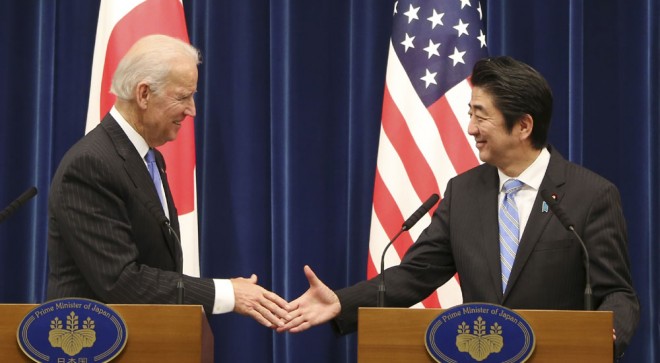Biden heads to China amid air zone tensions

US Vice President Joe Biden shakes hands with Japanese Prime Minister Shinzo Abe at the end of a joint press conference following their meeting at Abe’s official residence in Tokyo Tuesday, Dec. 3, 2013. Biden arrives in Beijing on Wednesday amid rising friction over a Chinese air zone, needing to tread between bolstering ties with the rising power and underscoring alliances with Tokyo and Seoul. AP
BEIJING—US Vice President Joe Biden arrives in Beijing on Wednesday amid rising friction over a Chinese air zone, needing to tread between bolstering ties with the rising power and underscoring alliances with Tokyo and Seoul.
His trip—which began in Japan and ends in South Korea – follows weeks of furor after Beijing declared an “air defence identification zone” (ADIZ) covering East China Sea islands also claimed by Japan.
The decades-old dispute between the historic rivals flared after Tokyo bought some of the islands from their private owners in September 2012.
Since then, Beijing has sent ships and aircraft to nearby waters while Japan scrambled fighter jets on hundreds of occasions, raising concerns of an unintended clash.
“This underscores the need for crisis management mechanisms and effective channels of communication between China and Japan to reduce risk of escalation,” Biden said in a joint press conference on Tuesday with Japanese Prime Minister Shinzo Abe.
Article continues after this advertisement“I will be raising these concerns in great specificity directly when I meet with the Chinese leadership,” he said. “We will remain steadfast in our alliance’s commitment.”
Article continues after this advertisementA US official said it was especially important “that we continue to amplify our messages that we are and always will be there for our allies”, adding that “there is a way for two major powers, in the US and China, to build a different kind of relationship for the 21st century.”
Widespread anger
Beijing provoked widespread anger late last month by declaring an ADIZ in which all aircraft had to obey Chinese orders or face unspecified “defensive emergency measures.”
Washington, Tokyo and Seoul all sent military or paramilitary planes into the zone in defiance of Beijing’s rules, while the US reiterated its security pact with Japan.
China for its part has accused the US and Japan—which both have ADIZs—of double standards, saying the real provocateur is Tokyo.
A senior administration official in Washington said Biden would discuss the wider concerns raised by the China’s defense zone declaration.
“It also allows the vice president … to make the broader point that there’s an emerging pattern of behavior by China that is unsettling to China’s own neighbors and raising questions about how China operates in international space and how China deals with areas of disagreement with its neighbors,” the official said.
Biden—who is set to meet with President Xi Jinping, Premier Li Keqiang and Vice President Li Yuanchao—will also have “a very wide-ranging dialogue” on other issues, the official said.
Officials stressed that the trip was planned before recent tensions and was aimed at emphasizing that the “United States is a resident Pacific power, we’re here to stay and we’re actively engaged on the full spectrum of issues in the region.”
Biden will fly on Thursday to South Korea to meet President Park Geun-Hye and mark the 60th anniversary of diplomatic relations, which the White House called a “linchpin of regional security.”